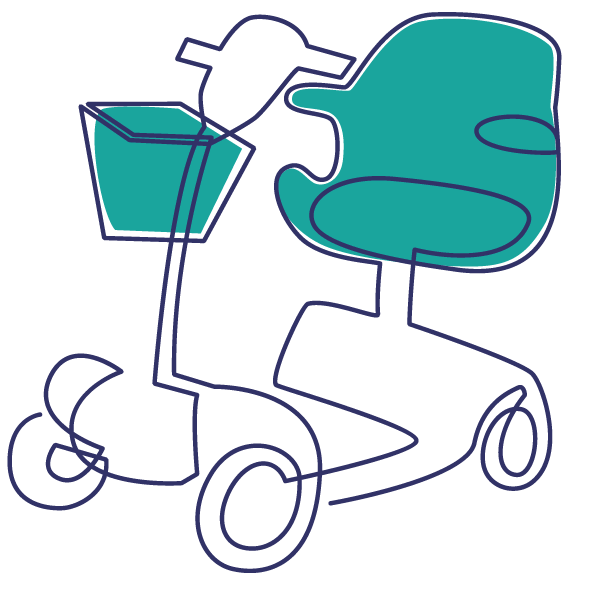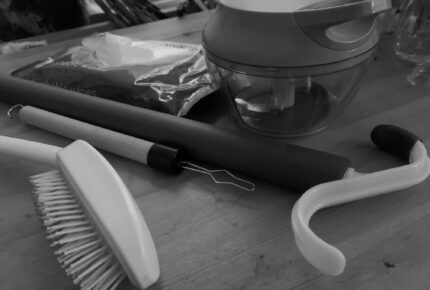Overview
Disabled people may be entitled to claim Value Added Tax (VAT) relief on disability goods and services that are designed for use by disabled people. This guide explains who can get VAT relief and the products and services that qualify in general. VAT rules can be complicated, and if your situation is unclear you should contact HMRC for clarification of your situation.
In general, disabled people do not have to pay VAT on goods and services that are designed or adapted solely for use by disabled people. These goods and services are often called ‘zero-rated’ or ‘eligible for VAT relief’
For goods and services to be zero-rated, all of the following conditions must be met:
- the customer is eligible to purchase supplies at the zero rate
- the goods are for the personal or domestic use of the customer
- the goods and services are eligible to be supplied at the zero rate
Getting products and services VAT-free
Do you qualify for the zero rate?
To get the product VAT free, you must have a disability that qualifies you for help. For VAT purposes, you are classed as being disabled or having a long-term illness if:
- you have a physical or mental impairment that affects your ability to carry out everyday activities, for example blindness, or
- you have a condition that’s treated as chronic sickness, like diabetes, or
- you are terminally ill
The definition does not include include someone who is only temporarily disabled or incapacitated, such as with a broken leg.
The HMRC website provides more detailed information here Get VAT relief on certain goods if you have a disability – GOV.UK (www.gov.uk)
What goods and services are eligible?
Examples of eligible goods and services are:
- wheelchairs and some mobility scooters
- emergency alarm call systems
- computer equipment designed for disabled people
- specialist beds and chair lifts
If you need to speak to HMRC for advice you can call their helpline
HM Revenue and Customs Disabled VAT Relief helpline
Tel: 0300 123 1073
Please note- when you call this number it will take you through to the HMRC Charities helpline. Listen to the options and press 5 for queries relating to VAT relief for individual disabled people.
You can also get VAT relief on some vehicles, see the HMRC website for more information about new, secondhand, adapted and Motability scheme vehicles. VAT relief on adapted motor vehicles for disabled people and charities (VAT Notice 1002) – GOV.UK (www.gov.uk)
How do I claim?
Most suppliers will know if their product has been specifically designed to help disabled people. They will offer their products free of VAT at the point of sale. You’ll need to confirm to them in writing that you are a disabled person. Most suppliers will use the form Notice 701/7 VAT reliefs for disabled people form
If you are shopping online, the supplier or manufacturer should have an online copy of the declaration form, which you can then fill in as you make your purchase.
Reduced rate VAT on mobility aids for older people
If you are aged 60 or over, some mobility aids can be supplied at a reduced rate of VAT, which is currently 5%
Your supplier should know about the reduced rate and apply it. You qualify if:
- you are over 60 when the product is supplied or installed
- the product is installed – you don’t get the reduced rate if you just buy it
- the product is for a private home, not for example a residential care home.
You can get reduced rate of VAT on the supply and installation of these items:
- grab rails
- ramps
- stair lifts
- bath lifts
- built-in shower seats or showers containing built-in shower seats
- walk in baths with sealed doors
Repairs of these goods don’t qualify for reduced rate VAT.
Your supplier will ask you to complete a simple declaration form stating your name, age, address and that the goods qualify.
For more information see the HMRC website Reliefs from VAT for disabled and older people (VAT Notice 701/7) – GOV.UK (www.gov.uk)
Expert information
You can find more information and examples on the Low Income Tax Reform Group’s website here Disabled/older people’s VAT reliefs | Low Incomes Tax Reform Group (litrg.org.uk).
Information last updated on 9 August 2024. Please note that information may be subject to change. All information is provided in good faith but Disability Information Scotland does not endorse any product or service referred to within this resource.
If you would like this information guide in another version then please contact us and we will post or email you a copy.
Aids, Equipment and Adaptations, Consumer Information:Frequently Asked Questions
Through our helpline we receive enquiries spanning a wide range of different topics. Here is a selection of those most asked:
Council Help for Disabled People
Scottish councils have responsibilities to help disabled people and their carers who qualify for help. These include:
- Financial help
- Care needs assessments for disabled people
- Providing support for carers
- Blue Badges
- Safeguarding people who are at risk of harm
Financial help
Councils are responsible for providing financial help, including
- Housing benefit – help with rent for people over State Pension age and for some younger people in special circumstances Claim Housing Benefit – mygov.scot
- Means-tested and non means-tested help with council tax costs Working out your council tax – mygov.scot
- Lump sum payments from the Scottish Welfare Fund; Crisis Grants (usually food, energy, or heating) or Community Care Grants to help people stay in, or settle into the community. https://www.mygov.scot/scottish-welfare-fund
Social work departments have powers to help with “Section 12” payments, for adults or children in an emergency if this would save the council costs in future. They can also make payments to promote the welfare of children in need.
Councils must also have a Housing “scheme of assistance” that may give information, advice, grants, loans, and practical assistance to homeowners or, to private tenants who need disability adaptations. https://scotland.shelter.org.uk/professional_resources/legal/housing_conditions/scheme_of_assistance
Most council areas will have a Care and Repair service that will provide advice and help to older people and (in some areas) disabled people who are homeowners or private tenants. Find your local service here Office Locations | Care and Repair Scotland
Care needs assessments for disabled people
If you are disabled, your council’s social work department (or in Highland, NHS Highland) can assess your care needs, and agree a care plan to support you. The help you receive may include equipment, adaptations to your home, care at home, day care or a care home. Any help you receive that is classed as “personal care” is free.
You should be offered a choice in how your care is provided; this is called Self-directed support. Your options within your budget form the council are:
- 1 – a direct payment to you or someone else (such as a care agency) to pay for your own support
- 2 – you arrange the support
- 3 – the local council arranges the support
- 4 – a mix of the above
Support for carers
The Carers (Scotland) Act gives carers a right to support from their local council. A carer is anyone who is not paid for their caring and looks after a friend, family member or neighbour who is disabled. You do not have to be caring for a specific number of hours to be a carer.
Your local Carers Centre can explain what help is available locally. Any help a carer received from their local council is free. Find your local Carers Centre here https://www.careinfoscotland.scot/topics/support-for-carers/carer-centres/ and find out more about carers rights here https://www.careinfoscotland.scot/topics/support-for-carers/
Blue Badges
A Blue Badges provides parking concessions for on-street parking, some car parks, and disabled parking bays, allowing badge holders to park close to where they need to go
A Blue Badge belongs to a person, not a vehicle, so they can travel as a driver or a passenger. Find out more about Blue Badges here: https://www.mygov.scot/apply-blue-badge/eligibility
Protecting people who are at risk of harm
Councils have powers under the Adult Support and Protection (Scotland) Act 2007 to protect adults who cannot look after their own safety and security and are at risk of harm because of disability, mental disorder, illness, physical or mental infirmity, sexual harm or institutional harm.
“Harm” means injury or damage and includes self-harm, neglect and abuse.
Councils and other public services (such as Police) will work together to support people. You can find out more here https://www.gov.scot/policies/social-care/adult-support-and-protection/
If you are worried that someone at risk of harm, you can find your local social work department here
Contact your council
You can find details of your council and its services here Organisations – mygov.scot
How can I get care or disability equipment at home?
If you need care, support or equipment at home, the first step is to contact your local council’s Social Work Department (or in Highland, NHS Highland) and ask for a Care needs assessment. You might qualify for an adaptation, equipment, care at home, or a budget you can use to arrange your own care. If you have a carer, they have a separate right to support from the council too. If the help you need counts as “free personal or nursing care” it will be free.
Aids, Equipment and Adaptations, Consumer Information:Search for Local Organisations
Our quick search tool can connect you to over 3000 service providers, suppliers and organisations supporting people across Scotland. To find support near you, simply enter your search term and select your local authority.
| Organisation | Description |
|---|---|
| ABC Hearing | Services provided: Providing hearing consultations to people with hearing problems and the supply suitable hearing aids to those that need them. These service can be carried out at ABC premises, or at the client’s own home throughout Edinburgh, the Bor… |
| Aberdeen Citizens Advice Bureau | Provide information to people living in the local area |
| Aberdeen City Council RADAR key provision | Local Authority providing RADAR keys |
| Ability Lifts | Ability Lifts were formed in 2004 with the goal of providing access products for those with mobility impairments. |
| Able Community Care Ltd | Able Community Care was one of the first Live-in Care providers, est. in 1980. We support people throughout the UK and have been offering support in Scotland and the offshore islands for over three decades. We often operate where other care providers d… |
| Able Deen | Loan of mobility equipment, safe space, signposting |
| About purchasing zero-rated adapted vehicles | Guidance on what you need to know about purchasing adapted vehicles free of VAT if you are disabled |
| Accessatlast Limited | Travel service for anyone requiring accessible information for holidays or for business |
| AccessiblEurope | Aims: Provide accessible tourist services to disabled travellers in Italy, Europe and Asia. Services provided: Website providing all kinds of tourist services for people with mobility difficulties. accessible hotels, farms, apartments, resorts, hotels,… |
| Acorn Stairlifts | Acorn stair lifts are a British manufacturer with factories in Yorkshire and East Lothian. We operate nationwide and offer a free no obligation survey. Acorn Stairlifts will help you master ‘the three Rs’: Regain your independence, Retain full use of y… |
- 1
- 2
- 3
- ...
- 25
- ...
- 35
- Next Page »

